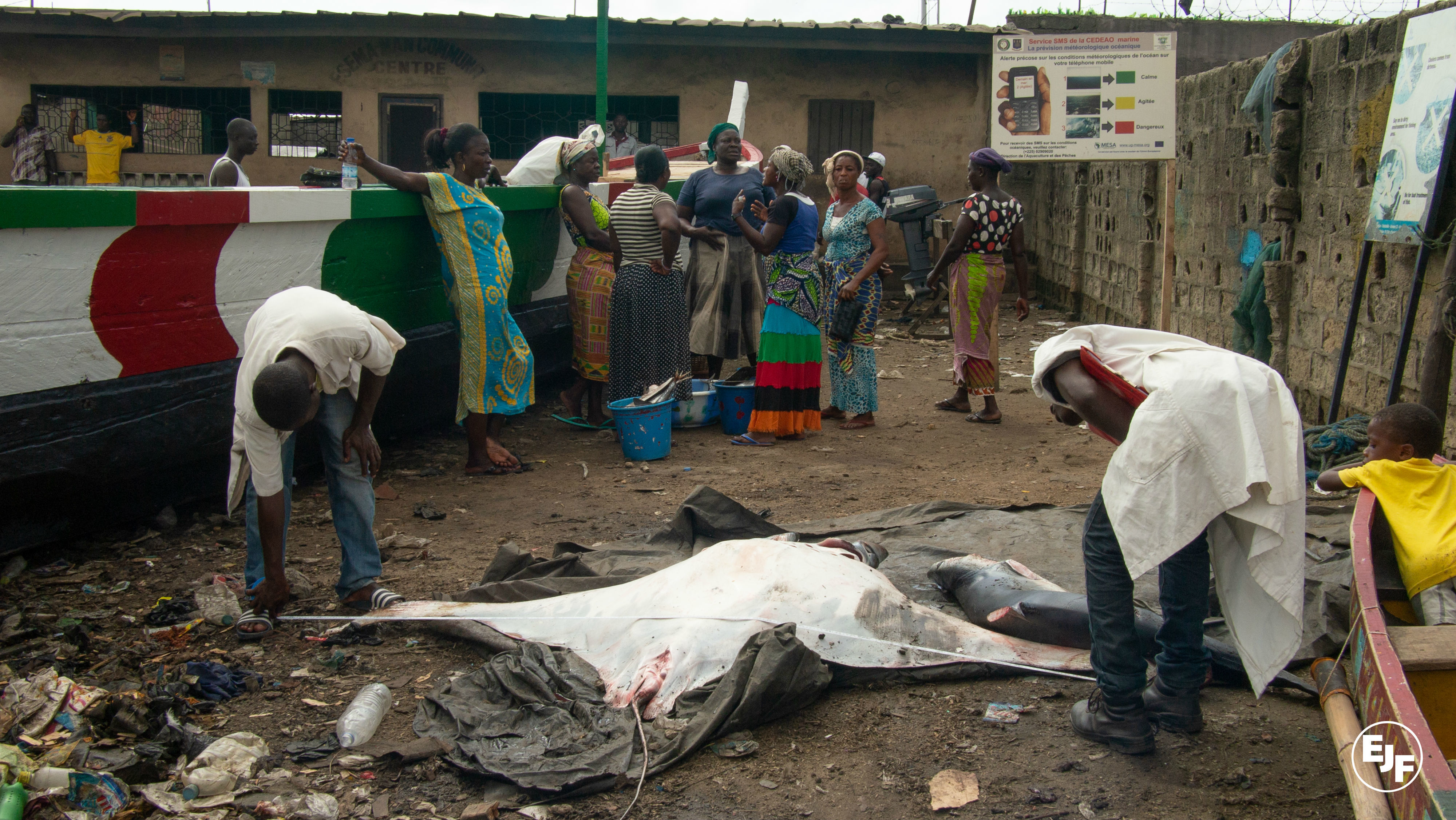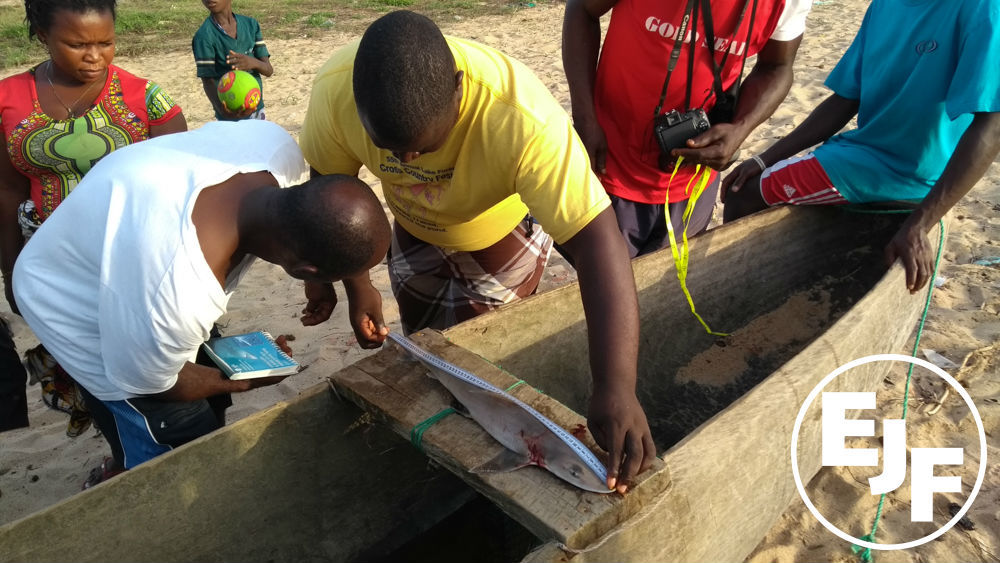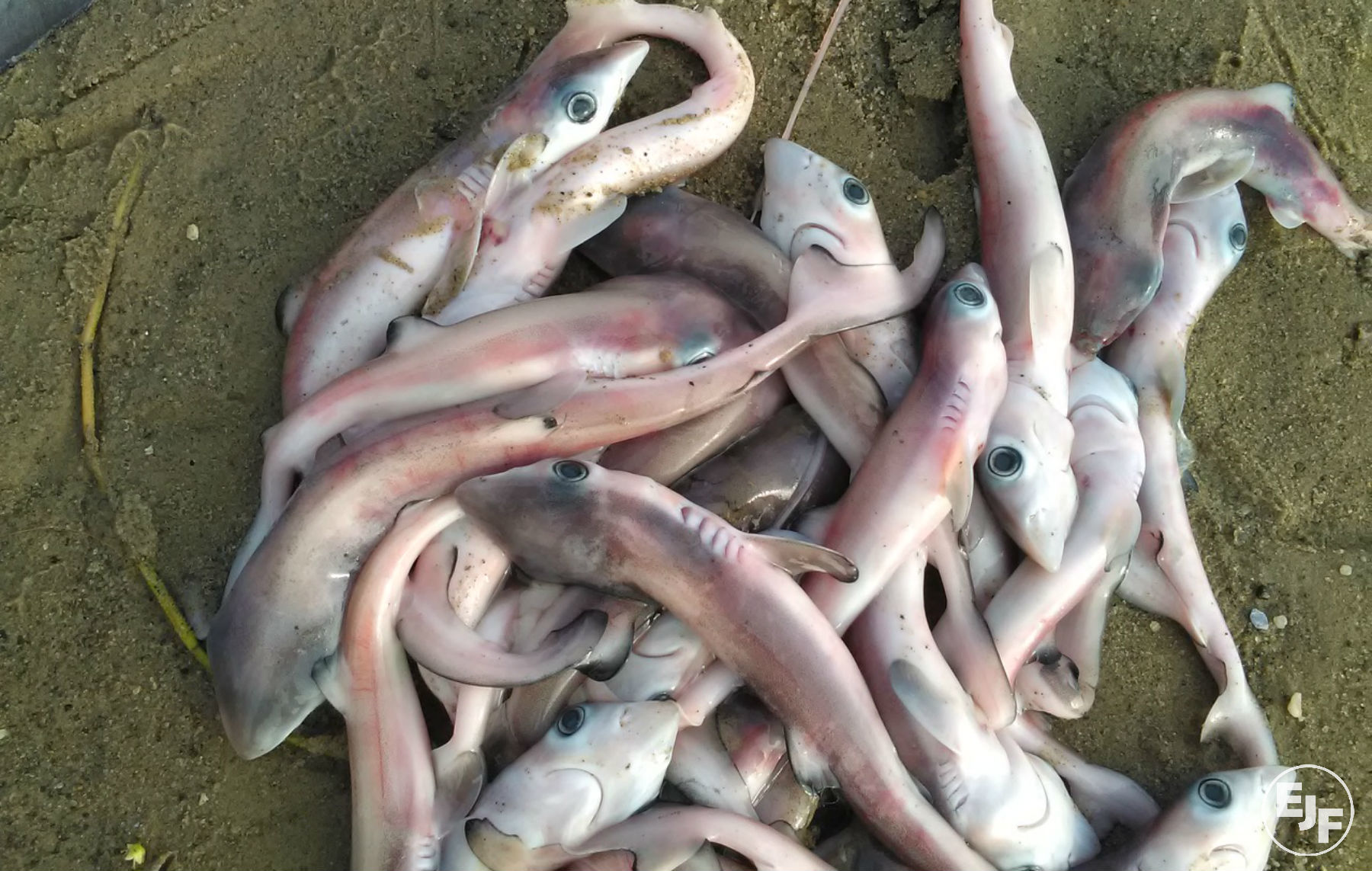
New project to sustainably manage sharks and rays in the Ivory coast
A pilot project to help sustainably manage sharks and rays in the Ivory Coast was launched this week by the Environmental Justice Foundation (EJF) with its partners the Oceanology Research Centre (CRO) and the government’s Aquaculture and Fisheries Directorate (DAP). By training observers to gather information on sharks and rays landed by canoe at key sites, the project will provide the basis for a sustainable management plan for these important species.
Sharks and rays play a vital role in the health of many marine habitats. Loss of sharks, for instance, can lead to dramatic imbalances in the ecosystem that can cause the degradation of coral reefs and destruction of seagrass beds, both of which provide important nursery habitats for young fish.
Unfortunately, sharks and rays are particularly vulnerable to overfishing because they tend to grow slowly, reach sexual maturity late and have low rates of reproduction. They currently lack any form of legal protection in the Ivory Coast. This could have real implications for the coastal communities that rely on healthy marine ecosystems to provide food.
“Very little is known about shark and ray populations in the Ivory Coast,” says Dr Tape, Head of Aquatic Resources Department from CRO. “We need to know more about factors such as the diversity of different species, and whether their abundances or body sizes are changing over time. This will tell us how or if fishing is affecting them, and whether we need to put any measures into place to give them greater protection.”
The initiative – which runs alongside EJF’s successful long-term shark and ray monitoring project in neighbouring Liberia – will collect data from sharks and rays being landed at three key sites in Abidjan, engaging local communities on the benefits of shark and ray conservation to local livelihoods.
“The lack of data on sharks and rays makes implementing effective management strategies very difficult. If we don’t know how healthy these populations are then we can’t say whether any particular species needs protection,” says Helguile Shep, Director of DAP.
Amdeep Sanghera, EJF’s coordinator for the project, adds: “Sharks and rays can play a central role in the health of the marine ecosystems that support local fishing communities. They are at the top of the food chain, and that means removing them can have effects that cascade down the entire ecosystem. This project will not only help protect sharks and rays but also preserve the ecosystems that provide food and livelihoods for coastal communities in Ivory Coast.”
ENDS
Notes for editors:
Watch the film for our shark campaign.
Sharks and Rays are in one of two sub-classes of cartilaginous fish, they are in the sub-class Elasmobranchii which currently contains around 1,000 extant species which can be further classified into around 400 species of sharks and 600 species of rays.
Sharks first appeared in the fossil record over 400 million years ago, nearly 300 million years before the dinosaurs. They occupy almost every marine ecosystem on earth and some can survive in freshwater, although no species lives there exclusively.
Worldwide, a quarter of all these species are classified as threatened as a direct result of overfishing.
- EJF is working to build local capacity amongst a new generation of ocean defenders. We aim to harness local strengths, expertise and skills and to give recognition to the local individuals and communities who are taking a lead on protecting their natural world.
- EJF is working globally to protect endangered sharks. We are calling for a global ban on shark finning and are working in the Ivory Coast and Liberia to secure national action plans to protect sharks, and for the first time give legal protection to these threatened species, with the aim of building our work across the West African region.
- EJF is calling for the protection of Inshore Exclusion Zones - reserved for artisanal fishers – and expansion of Marine Protected Areas to allow fish stocks to recover and to provide refuge for endangered or vulnerable species.
- EJF is calling for the complete ban on destructive fishing gears, including bottom-trawling, electro-fishing, and the use of explosives and poison as an important step towards limiting bycatch levels and recovering the marine environment for the benefit of marine species and the coastal communities.
- EJF is calling for all countries to require their vessels to show documentation of bycatch capture and to levy strong and appropriate penalties against those vessels discarding bycatch without documentation. If adequately enforced this would act as a deterrent against vessels dumping bycatch back in the ocean.
The Environmental Justice Foundation is a UK-based charity working internationally to protect the environment and defend human rights. EJF is a charity registered in England and Wales (1088128). www.ejfoundation.org
The Oceanology Research Centre, an Ivorian National Public Establishment, is working to carry out the necessary research to compile data on the coastal and marine local environment, in order to implement a management system of natural marine resources. http://www.cro-ci.net
The Aquaculture and Fisheries Directorate (DAP) is responsible for, among other aspects:
- Fighting against illegal, unreported and unregulated fishing by coordinating monitoring activities, in liaison with the relevant technical services;
- Promoting sustainable management of fisheries resources;
- Organising and monitoring the management of fisheries resources;
- Proposing and setting up specialized structures of to provide support and advice to the fishers and aquaculturists.
http://www.ressourcesanimales.gouv.ci
Contact:
Tidiane Diaby
tidiane.diaby@ejfoundation.org Tel: +225 57861404

